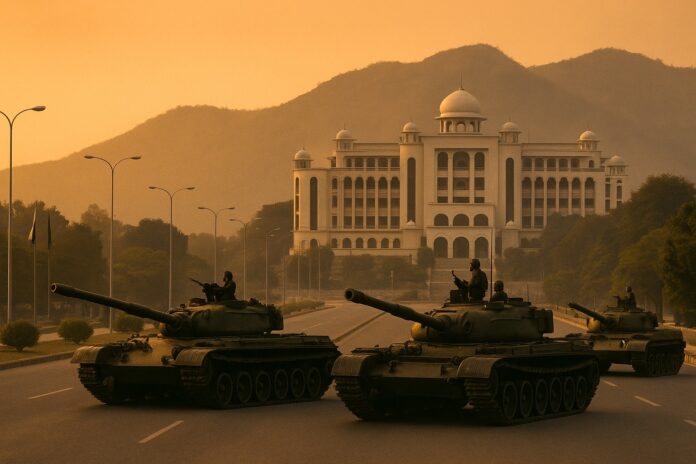On 12 October 1999, Pakistan’s fragile democracy suffered a familiar rupture. General Pervez Musharraf ousted Prime Minister Nawaz Sharif in a bloodless coup, suspending the constitution and promising to rescue the nation from corruption and incompetence. For many citizens weary of Sharif’s government, there was initial relief. Yet the takeover marked not a restoration, but a continuation of a pattern that has defined Pakistan since its earliest years.
Military interventions in Pakistan do not arrive as brief storms. They linger, reshape institutions, and cast shadows long after the tanks have rolled away. Musharraf’s coup may be twenty-five years in the past, but its imprint still frames the country’s political life.
A history of unfinished mandates
Pakistan has had 29 prime ministers. Not one has completed a full five-year term. Zulfiqar Ali Bhutto was overthrown in 1977 when General Zia-ul-Haq staged a coup after disputed elections. Benazir Bhutto was dismissed twice in the 1990s, with presidents invoking constitutional powers in close consultation with the military. Nawaz Sharif himself, before falling to Musharraf, was ousted in 1993 during a confrontation with the army high command. More recently, Imran Khan was removed in 2022 once the generals withdrew their support.
Each removal is dressed up in the language of legality, morality or national emergency. Yet behind the scenes, the military has consistently acted as arbiter, deciding when civilian leaders have overstepped, and when they must go. The result is a revolving door of premiers, none permitted to translate electoral mandates into uninterrupted governance.
From direct coups to hybrid control
Musharraf’s coup in 1999 was the last open declaration of military rule, but not the end of military dominance. Since then, Pakistan has lived under hybrid regimes — civilian governments whose survival depends on military consent. Imran Khan’s tenure between 2018 and 2022 was widely seen as such an arrangement, engineered through an election marred by allegations of pressure on opponents and selective accountability cases.
When the generals fell out with Khan over appointments and foreign policy, his parliamentary majority crumbled almost overnight. It was the same script in subtler form: a leader elevated and removed not by voters alone, but by the establishment’s decision.
The cost of perpetual intervention
The effects of this cycle are corrosive. Each intervention erodes faith in the value of elections. Citizens are left wondering whether their ballots have meaning, or whether the outcome is already decided elsewhere. Institutions bend under pressure; courts and election commissions become tools of convenience rather than guardians of law. And politics becomes brittle, reliant not on compromise and consensus but on military sanction.
Musharraf promised “real democracy” when he seized power. Instead, he left behind a template where democratic forms mask authoritarian habits. It is why Pakistan remains suspended between promise and paralysis: a republic that holds regular elections, yet struggles to establish genuine civilian supremacy.
The coup’s unfinished shadow
The coup of 1999 did not end with Musharraf’s resignation in 2008. It lingers in the enduring presence of generals alongside elected leaders, in the intimidation of opposition parties, and in the culture of fear that surrounds dissent. Pakistan’s politics remains defined not by continuity of civilian authority but by the spectre of intervention.
The lesson should by now be clear. Military power can seize authority but it cannot deliver legitimacy. Every “rescue” has left Pakistan weaker. Until prime ministers are allowed to serve their full terms, until parliaments legislate without interference, and until the barracks recede from politics, the coup that began twenty-five years ago will remain unfinished.

